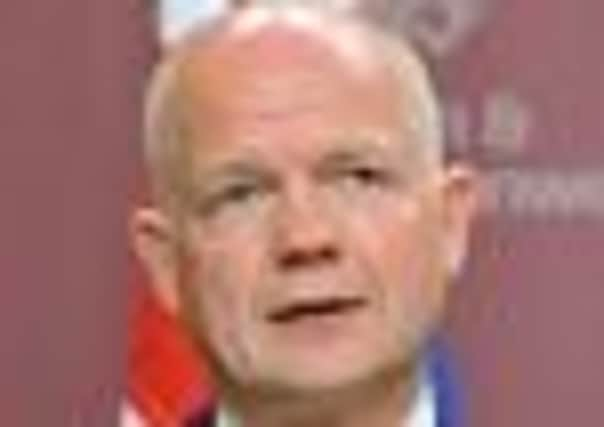‘Labour connived to free Lockerbie bomber’ – Hague


In an unusually harsh critique from a foreign secretary, Mr Hague said Gordon Brown and Tony Blair had “strutted the world stage”, agonising about Britain’s influence on Europe and the US, while neglecting the country’s interests at home.
On defence, a “black hole” had been created in the country’s army, navy and air force budget while, he added, ministers failed to prepare for the aftermath in Iraq.
Advertisement
Hide AdAdvertisement
Hide AdOn diplomacy, they “sidelined and ran down” the Foreign Office, he added, closing embassies and the department’s language school.
And, he said, they “signed away” British rights to the EU, “neglecting what they were morally and politically obliged to do, to consult the people of this country”.
Singling out the release of the Lockerbie bomber, Abdelbaset Ali Mohmed al-Megrahi, Mr Hague added: “They connived in the release of the Lockerbie bomber. Two years ago we said the decision to release al-Megrahi was wrong, and now the whole world can see that we were right.”
Mr Hague’s attack came in a speech in which he sought repeatedly to claim he had been right in his euro-sceptic stance both as Conservative Party leader and in government office.
To sustained applause, he argued that the influence of the EU should be reduced, saying that “when the right moments come, this party should set out to reduce it”.
His comments came after London Mayor Boris Johnson had broken ranks the night before to suggest that voters deserved a chance to have a direct say on Britain’s relationship with Europe, in a referendum.
However, the government’s official stance is to rule out any such popular vote, with David Cameron having told conference on Tuesday they should not be focusing on the matter.
Mr Hague’s direct attack at Labour’s stance on the Lockerbie bomber follows a report written by the country’s most senior civil servant, Sir Gus O’Donnell, which concluded that the Labour government did “all it could” to help facilitate the release of Megrahi in 2009.
Advertisement
Hide AdAdvertisement
Hide AdWhile there was no evidence to show they had actively lobbied the Scottish Government to free him, Sir Gus concluded there was an “underlying desire” to see him return to Libya.
He said the information showed UK ministers had changed their position on the transfer of Libyan prisoners due to commercial considerations, including lobbying by oil firm BP.
The Libyans have subsequently claimed Megrahi’s fate was “on the table” in the infamous “deal in the desert” conducted by Tony Blair and Colonel Muammar al-Gaddafi in 2007.
In their defence, Mr Blair and former justice secretary Jack Straw have insisted that their dealings with the former Gaddafi regime helped to persuade him to end his weapons development programme.
Megrahi remains alive in Tripoli, more than two years on from his release.
In a recorded interview earlier this week, he suggested that the truth of the bombing would soon emerge.
A spokesman for justice secretary Kenny MacAskill said last night: “Both Labour and the Tories are guilty of astonishing hypocrisy.
“We know from Sir Gus O’Donnell’s report that the last UK Labour government did ‘all it could’ to help release Megrahi in return for an oil deal and closer links with Gaddafi – equally, former Tory trade minister Lord Trefgarne wrote to Scottish justice secretary Kenny MacAskill, entirely inappropriately, saying that ‘speed is of the essence’ in returning Megrahi to Libya for reasons of trade and business interests.”
Advertisement
Hide AdAdvertisement
Hide AdHe added: “As all the published documentation demonstrates, only the Scottish Government played with a straight bat on this matter.”
Mr Hague also said Britain could be “immensely proud” of its part in overthrowing Gaddafi.
Prime Minister David Cameron had the “steel and the humanity” to call for a no-fly zone over Libya in its “hour of crisis”, he said.
The coalition’s new National Security Council had met nearly 60 times to discuss the situation in Libya, Mr Hague said. Elsewhere in his speech, Mr Hague outlined changes to the delivery of foreign policy, saying he intended to do more to expand diplomatic contacts in China, India, Indonesia and other developing nations such as Brazil.
He also said that the new National Security Council, which brings together ministers with the defence chiefs and intelligence bosses, had ensured proper decision making on key foreign affairs matters.
“Sofa government is out and cabinet government is back,” he said.
On Europe, Mr Hague said that no new powers could be transferred from Britain to the EU without a referendum.
He added: “The EU has more power in our national life than it should, and I believe as strongly as I ever that when the right moments come this party should set out to reduce it.”